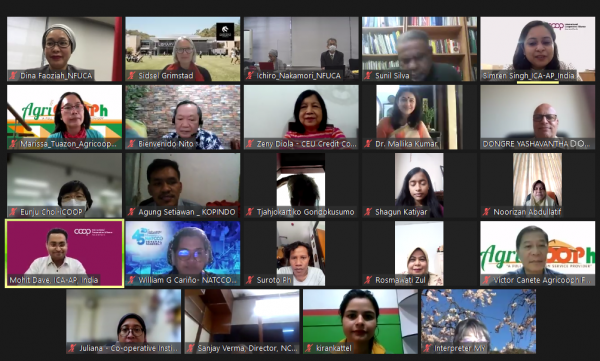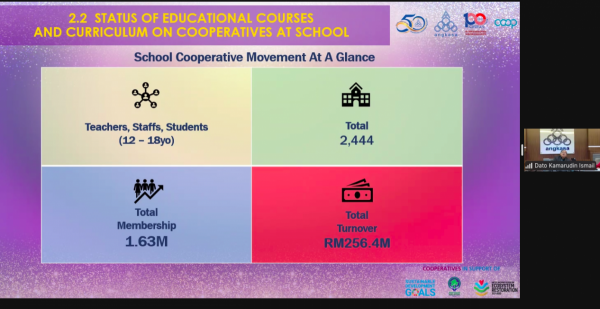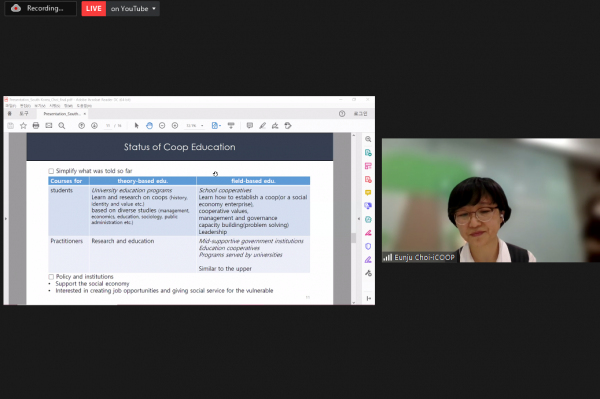
ICA-AP Committee on Cooperative Research (CCR) conducted COOP Colloquium 2.0 on 26 April 2022 to build upon its series of academic dialogues on issues that are relevant to cooperative education and research. The second iteration was held in collaboration with the ICA-AP Committee on Cooperatives in Educational Institutions (ICEI) on the theme ‘Making Coop Education Attractive to Millennials: Gaps and Opportunities’. Over 90 participants from 18 countries joined the webinar.
Mr. Mohit Dave, Secretary, ICA-AP CCR and Ms. Simren Singh, Secretary ICEI moderated the webinar. They set the context with the 2021 global thematic study by all ICA regional offices under the ICA-EU Partnership, titled, ‘Young People and Cooperatives: A Perfect Match?’ which explored and analysed cooperative education in Asia-Pacific, Europe, Africa and the Americas, as perceived by young people within and outside the cooperative movement. The study showed that young people irrespective of their nationality demand good public education that is free or affordable, relevant and competitive. Given that these demands are not adequately being met, is there a way that cooperative advocates can leverage these existing demands? Is there a way to push for reforms in schools and universities that exclusively cater to education on cooperatives? And, how can we make education on cooperatives i.e., curriculum, trainings, and practical exposure via campus cooperatives interesting, relevant, competitive and promising?
Dr. Yashvantha Dongre, Chairperson, ICA-AP CCR welcomed the participants. He said that the experience of cooperative scholarship across the Asia and Pacific region is rich and diverse, and ICA-AP CCR would like to bring these together in COOP Colloquium to share, inform and learn.
Mr. Balasubramanian Iyer, Regional Director, ICA-AP shared his opening remarks through a video message. He welcomed the initiative to discuss how to make cooperative education attractive for millennials. The ICA-AP regional office has had several activities and consultations to get across views and opinions from the millennials in and outside the cooperative movement. He commended the support of countries like Malaysia, S. Korea, India and Australia in encouraging education and research on the cooperative enterprise.

Dato' Kamarudin Ismail, Board member, Malaysian National Cooperative Movement (ANGKASA) made a presentation on its aim to further deepen the understanding and appreciation of school cooperatives to promote the sector’s significant contributions to national development in the areas of poverty alleviation, community building, social justice, and economic growth. Dr. Sidsel Grimstad, Professor, University of Newcastle (Australia) spoke about their work as a leading institute in the country dedicated to cooperative education, training and research engagements. Schools and universities (undergraduate and post-graduate levels) have an important role to play in making positive interventions in cooperatives.
Dr. Mallika Kumar, Professor, Sri Ram College of Commerce (India) made a presentation on the status of educational courses and curriculum on cooperatives at school and university levels in India. She explained the expectations, challenges and feedback from students as well. Identifying stakeholders for future actions, she made important recommendations to improve education on cooperatives. Dr. Eunju Choi, Director, iCOOP Institute shared her experience in S. Korea. She underlined four areas where interventions are critical to addressing the education-based challenges of millennials as well as to ensuring the growth and continuity of the cooperative sector worldwide. These areas include (1) Public awareness about cooperatives, (2) basic education on the model and values of cooperation, (3) specialised education in cooperative business management and operations, and (4) practical experience in running and managing cooperative businesses.

The moderators thanked the presenters and hoped it will inspire the viewers to go back to the core of the cooperative education and research framework. Cooperatives need to appeal to the millennials to deliver the education paradigm the Asia-Pacific region has long aspired for: to be a major tool for skill development through the collective empowerment and cooperation of its members. This colloquium was a starting point to these discussions, bringing together cooperative advocates, practitioners and youth from the Asia and Pacific region who are committed to infuse meaning, relevance, enthusiasm, and promising returns in the formal education space for cooperatives.



